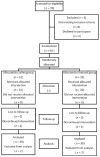The effect of addition of low dose fentanyl to epidural bupivacaine (0.5%) in patients undergoing elective caesarean section: A randomized, parallel group, double blind, placebo controlled study
- PMID: 25511214
- PMCID: PMC4944362
- DOI: 10.4103/0022-3859.147032
The effect of addition of low dose fentanyl to epidural bupivacaine (0.5%) in patients undergoing elective caesarean section: A randomized, parallel group, double blind, placebo controlled study
Abstract
Background: Opioids have synergistic action with local anesthetics which may alter characteristics of epidural block. Giving opioids to mother before delivery of baby is still fully not accepted with some fearing risk of neonatal depression.
Aims: Our primary aim was to evaluate the analgesic effect of addition of 50 μg fentanyl to epidural 0.5% bupivacaine in patients undergoing elective caesarean section using visual analog scale. The secondary aim was to assess onset of analgesia, volume of drug required to achieve T6 level, grade and duration of motor block and Apgar score.
Materials and methods: In this prospective, randomized, double blind, placebo controlled study 64 patients scheduled for elective caesarean section under epidural anesthesia were randomly divided into two groups of 32 each. The fentanyl group received 1 ml of 50 μg fentanyl and the saline group received 1 ml of normal saline mixed with 10 ml of 0.5% bupivacaine for epidural anesthesia. VAS score, time to achieve T6 level, dose of bupivacaine, intraoperative analgesic consumption and duration of analgesia, grade and duration of motor block and any adverse maternal and neonatal effects were noted.
Statistical analysis: Data was analyzed using Students t test, chi-square test and Mann-Whitney U-test. The values of P<0.05 were considered statistically significant.
Results: Fentanyl improved the VAS score significantly (1.6±1.32) compared to the saline group (3.77±1.0, P<0.0001). It also reduced the intraoperaitve analgesic supplementation compared to the saline group. (P=0.031). The postoperative duration of analgesia was prolonged in the fentanyl group (275.80±13.61 min) compared to the saline group (191.47±12.16 min, P<0.0001). The other characteristics of epidural block were unaltered.
Conclusion: Addition of 50 μg fentanyl to epidural 0.5% bupivacaine significantly reduces the VAS score. It also reduces intra-operative analgesia supplementation and prolongs the duration of postoperative analgesia without altering the other characteristics of block. The neonatal outcome is not affected with addition of fentanyl before delivery of baby.
Conflict of interest statement
References
-
- Hillyard SG, Bate TE, Corcoran TB, Paech MJ, O’sullivan G. Extending epidural analgesia for emergency Caesarean section: A meta-analysis. Br J Anaesth. 2011;107:668–78. - PubMed
-
- Alahuhta S, Kangas-Saarela T, Hollmén AI, Edström HH. Visceral pain during caesarean section under spinal and epidural anaesthesia with bupivacaine. Act AnaesthesiolScand. 1990;34:95–8. - PubMed
-
- Shapiro A, Fredman B, Olsfanger D, Jedeiking R. Anaesthesia for caesarean delivery: Low-dose epidural bupivacaine plus fentanyl. Int J ObstetAnesth. 1998;7:23–6. - PubMed
Publication types
MeSH terms
Substances
LinkOut - more resources
Full Text Sources
Other Literature Sources
Medical

